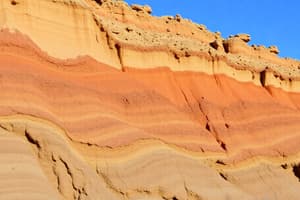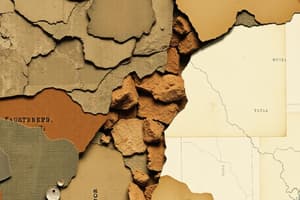Podcast
Questions and Answers
What is the principal agent behind both physical and chemical weathering?
What is the principal agent behind both physical and chemical weathering?
- Heat
- Water (correct)
- Biological organisms
- Atmospheric gases
Which process involves the transport of rocks and minerals by agents such as water, ice, snow, and wind?
Which process involves the transport of rocks and minerals by agents such as water, ice, snow, and wind?
- Physical weathering
- Chemical weathering
- Erosion (correct)
- Biological weathering
What type of weathering involves the breakdown of rocks and soils through the mechanical effects of heat, water, ice, or other agents?
What type of weathering involves the breakdown of rocks and soils through the mechanical effects of heat, water, ice, or other agents?
- Erosion
- Biological weathering
- Chemical weathering
- Physical weathering (correct)
What is the material left over after the rock breaks down combined with to create soil?
What is the material left over after the rock breaks down combined with to create soil?
Which type of rock covers 66% of the Earth's continents and much of its ocean floor?
Which type of rock covers 66% of the Earth's continents and much of its ocean floor?
Flashcards are hidden until you start studying
Study Notes
Weathering and Erosion
- Water is the principal agent behind both physical and chemical weathering, playing a critical role in breaking down rocks and minerals.
- Erosion involves the transport of rocks and minerals through agents such as water, ice, snow, and wind, reshaping landscapes over time.
Types of Weathering
- Mechanical weathering breaks down rocks through physical processes including heat, water, and ice, without altering the chemical composition of the rocks.
- Chemical weathering involves the alteration of the mineral composition in rocks due to chemical reactions, often involving water and atmospheric gases.
Soil Formation
- The material left over after rocks break down, known as sediment, combines with organic matter, minerals, and nutrients to create soil, essential for plant growth.
Rock Composition
- Sedimentary rock covers approximately 66% of the Earth's continents and much of the ocean floor, formed from the accumulation of sediment over time.
Studying That Suits You
Use AI to generate personalized quizzes and flashcards to suit your learning preferences.




